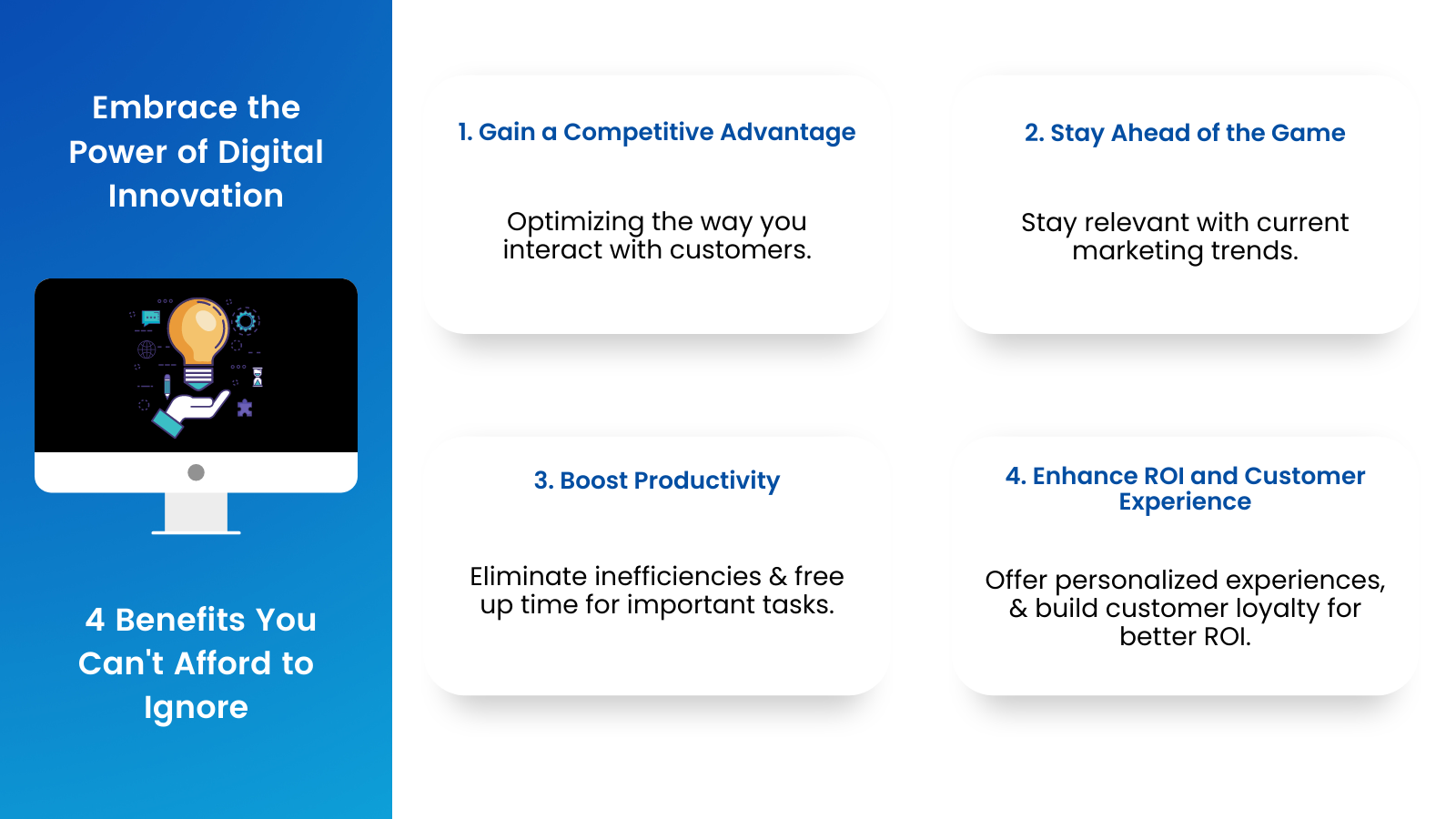
Digital innovation is the buzzword of the century, and rightly so! If there is one thing you need to stay in the game and keep winning, it’s to find new ways, better ways to solve old problems. And the phenomenal benefits of digital innovation are precisely why it’s transforming every industry in remarkable ways.
The everyday life of your customers has largely moved to the digital space where everything, be it watching a movie, chatting with friends, shopping, or paying the bills, is contained within their mobile phones; what more? They choose to do all these within the confines of their homes. So if you want to serve this customer base, you need to meet them where they are.
And this is exactly what the experts are saying! Get ready for a game-changing revolution! Digitally transformed organizations are set to fuel over half of the global GDP with a mind-blowing $53.3 trillion contribution. Are you ready to join the digital era and ride the wave of success?
Continue reading as we explore digital transformation, how to adopt it, and equip your business to make the most of this opportunity.
Also Read: How Quixy made a Digital Impact at INDIASOFT Hyderabad
What is Digital Innovation?
Digital Innovation refers to the process of introducing and adopting new digital technologies to solve existing business problems as well as to advance and improve organizational practices.
You might have also come across the term digital transformation; this refers to the overall change in your organization.
So, in a nutshell, if you take up a single business problem and use digital technology to solve it, you are introducing digital innovation in your organization. And this is often the beginning of a long and strategic digital transformation journey.
Also Read: 80+ Digital Transformation Statistics and Trends To Help You Navigate
Digital Innovation vs. Digital Transformation: Unleashing the Power of Change
In the dynamic realm of the digital era, two terms frequently dominate discussions: digital innovation and digital transformation. Despite their apparent similarities, these concepts possess distinct yet interconnected characteristics that hold the potential to revolutionize businesses and industries. Let’s explore the captivating world of digital innovation and transformation to unravel their nuances and explore how they intertwine.
Innovation is about embracing novel technologies and groundbreaking ideas to drive progress. It leverages emerging tools like artificial intelligence, data analytics, cloud computing, and IoT to revolutionize existing processes, products, or services. Digital innovation thrives on disruption and seeks to create new experiences, disrupting traditional models to uncover fresh opportunities.
On the other hand, digital transformation encompasses a broader, more holistic approach. It involves integrating digital technologies into all aspects of an organization, leading to significant and comprehensive change. Digital transformation transcends individual innovations, aiming to redefine an organization’s operations, culture, and customer interactions. It involves a mindset shift, reimagining business models & strategies to thrive in the digital age.
While digital innovation drives specific improvements and advancements, digital transformation aims for a larger-scale overhaul. Think of digital innovation as the fuel that powers the engine of digital transformation. Innovation acts as the catalyst, igniting the change required to achieve a full-fledged transformation.
So, whether aiming to harness the power of digital innovation or embark on a comprehensive digital transformation journey, remember that embracing change is key. Embrace the opportunities presented by emerging technologies, foster a culture of innovation, and continuously evolve to stay at the frontline of the digital revolution.
What are the areas where Digital Innovation comes in?
There are three primary areas where you can introduce digital innovation. They are:
- Move from analog to digital processes.
- Start adopting new software and platforms.
- Develop a whole new technology strategy in an existing business context.
Types of Digital Innovation
| Type of Innovation | Definition | Examples |
|---|---|---|
| Product Innovation | Developing new or improved digital products or services. | Smart home devices (Amazon Echo, Google Nest), streaming platforms (Netflix, Spotify), mobile apps (TikTok, Duolingo). |
| Process Innovation | Using digital tools to optimize or reinvent business processes. | Robotic process automation (RPA), AI-powered supply chain systems, digital workflows for onboarding or support. |
| Business Model Innovation | Transforming how a company creates, delivers, and captures value digitally. | Subscription models (Adobe Creative Cloud), platform-based models (Uber, Airbnb), freemium models (Dropbox, Zoom). |
| Customer Experience Innovation | Enhancing how customers interact with a brand or product digitally. | Personalized recommendations (Amazon), AR try-on features (Sephora Virtual Artist), AI chatbots for customer support. |
| Service Innovation | Introducing new or improved digital services to meet customer needs. | Telemedicine platforms (Teladoc, Amwell), online learning platforms (Coursera, Khan Academy), digital banking (Revolut, Chime). |
| Technological Innovation | Developing or adopting cutting-edge digital technologies to drive innovation. | Blockchain (Bitcoin, Ethereum), AI for predictive analytics, IoT for smart devices and ecosystems. |
| Organizational Innovation | Using digital tools to transform internal operations, culture, or collaboration. | Remote work tools (Slack, Microsoft Teams, Zoom), digital HR platforms, cloud collaboration tools (Google Workspace, Notion). |
| Ecosystem Innovation | Creating or participating in digital ecosystems that connect multiple stakeholders. | Apple’s ecosystem, smart city initiatives, open banking platforms. |
| Data-Driven Innovation | Leveraging data analytics and insights to drive decision-making and create value. | Predictive maintenance in manufacturing, personalized marketing campaigns, real-time traffic management systems. |
| Sustainability Innovation | Using digital technologies to address environmental and social challenges. | Smart energy grids, carbon footprint tracking apps (JouleBug, MyCarbon), digital twins for resource optimization. |
| Disruptive Innovation | Introducing digital solutions that fundamentally change existing markets or create new ones. | Streaming services (Netflix), ride-sharing apps (Uber, Lyft), cryptocurrencies (Bitcoin). |
| Incremental Innovation | Making small, continuous improvements to existing digital products or processes. | Regular app updates, enhanced user interfaces, optimized algorithms for faster performance. |
What are the benefits of Digital Innovation?
Here are some benefits you will see once you introduce digital innovation.

1. Added competitive advantage
Digital innovation can add value to every part of your organization, whether it is improving your product or offering, optimizing the way you interact with customers, processing your data, or improving internal processes.
This will inevitably help you carry out your business more efficiently, improve your returns, and give your organization a competitive edge.
2. Keeps you protected
It goes hand in hand with previous advantage we spoke about. If your competitors are doing something, you don’t want to be the only person left behind because you refuse to adopt new technology trends. It is also important to understand that digital innovation comes in waves with the introduction of new technologies. So it is essential to keep updating so that you don’t get left behind.
Being competent means giving your employees the resources they need to be productive. Inefficiency will result in mistakes, waste time and resources, and waste your profits.
3. High productivity in all fields
Digital innovation improves productivity in three main ways.
Data is something we have a lot of now. But the key here is to make the most of this data. Digital innovation is the way to convert this data into actionable insights that will help your business.
The next big thing is automation, and it is here now. Digital innovation lets you take advantage of this and adopt technologies that make your work easier. The same goes for streamlining the whole operation so that time does not go in vain on waiting or redundant work. It is a great place to get started, as you will see the benefits also immediately.
4. Increases ROI and customer experience
Since this lets you be more efficient and get the desired results, it improves the return on investment. Over time you will have enhanced processes that cut costs and establish sustainable financial gains.
Digital innovation also allows you to meet customer demands and offer them a personalized experience, thus building on customer satisfaction and loyalty, which will also pay off in the long run.
Also Read: AI Revolution: Top 60 Statistics and Predictions
5 Examples of Digital Innovation in Action
Digital innovation is transforming industries and creating new opportunities for businesses and consumers alike. Here are five examples of digital innovation in action:
Artificial Intelligence (AI) in Healthcare
Example: IBM Watson Health uses AI to analyze vast amounts of medical data, helping doctors diagnose diseases like cancer more accurately and quickly. AI-powered tools also assist in drug discovery, personalized treatment plans, and predictive analytics for patient care.
Impact: Improves patient outcomes, reduces healthcare costs, and accelerates medical research.
Blockchain in Supply Chain Management
Example: Walmart uses blockchain technology to track food products from farm to store. By scanning a product’s barcode, Walmart can trace its entire journey, ensuring transparency and safety in the supply chain.
Impact: Enhances traceability, reduces fraud, and ensures faster recalls in case of contamination.
Augmented Reality (AR) in Retail
Example: IKEA’s AR app, IKEA Place, allows customers to visualize how furniture will look in their homes before purchasing. Users can place virtual furniture in their space using their smartphone cameras.
Impact: Improves customer experience, reduces return rates, and boosts sales by helping customers make informed decisions.
Internet of Things (IoT) in Smart Cities
Example: Barcelona has implemented IoT sensors across the city to monitor air quality, manage waste collection, optimize street lighting, and control water usage. These sensors collect real-time data to improve urban living.
Impact: Increases energy efficiency, reduces pollution, and enhances the quality of life for residents.
Digital Payments and Fintech Innovations
Example: Companies like PayPal, Square, and mobile payment platforms (e.g., Apple Pay, Google Pay) have revolutionized how people transact. In emerging markets, mobile money services like M-Pesa in Kenya enable millions of unbanked individuals to access financial services.
Impact: Promotes financial inclusion, simplifies transactions, and drives economic growth.
These examples highlight how digital innovation is reshaping industries, improving efficiency, and creating value for businesses and consumers.
How to get started with your Digital Innovation journey?
Digital innovation is not limited to a sector or industry. According to Garter, by 2025, all industries will introduce digital transformation.
Here are a few things you can start with to get you inspired to introduce digital innovation in your organization.
1. A Digital Innovation team
Having experts from different areas of your business sit together and identify inefficiencies that can be solved is a surefire way to improve your organization. Ensure that these individuals are up to date on the latest digital technologies so that they can understand what and how to adopt them to set you on the path of digital innovation.
2. Agile experimentation model
You can’t make something perfect today and expect it to remain perfect two years from now. This is where introducing an agile model that constantly challenges you to continue improving will be a great strategy. The agile model will help the organization address the changing customer needs and demands and ensure that they solve problems in the best possible way.
3. Incorporation of new software
There are new software and technologies that are available. It is essential to know their capabilities and identify what will be suitable for your business. Investing in these technologies will pay off in the long run and ensure you are making the best use of the software in the market.

4. Prioritizing Digital Innovation in company strategy
This is highly crucial because innovation will be met with resistance initially. So it is critical to establish a system that objectively weighs the return on investment, risks, and benefits so that the right projects are prioritized to get maximum benefits. It is also vital to ensure your employees and leaders are on board and are willing to learn and continuously innovate to ensure the success of the organization.
Fueling Growth through Digital Innovation: Key Focus Areas for Success
Digital innovation has become a driving force for organizations seeking growth and success in today’s dynamic landscape. To chart a successful course, it is vital to identify key focus areas that will empower your organization to thrive in the digital realm. Let’s delve into the essential areas of emphasis that will unlock your organization’s potential for digital innovation and fuel its growth.
- Elevate Customer Experiences: Personalize interactions, streamline processes and create seamless experiences across all touchpoints to cultivate loyalty and sustainable growth.
- Harness Data Insights: Utilize data analytics to inform decision-making, gain actionable insights, and improve operational efficiency.
- Foster an Agile Culture: Encourage experimentation, cross-functional collaboration, and a growth mindset to drive innovation at every level.
- Collaborate within the Digital Ecosystem: Form strategic partnerships and leverage external expertise to accelerate digital innovation initiatives.
- Embrace Emerging Technologies: Stay updated on advancements like AI, machine learning, IoT, blockchain, and AR/VR to identify opportunities for integration and innovation.
- Invest in Innovation: Allocate research, development, and prototyping resources to fuel growth and future success.
- Continuously Evaluate and Optimize: Gather customer feedback, measure key performance indicators, and iterate for ongoing improvement and excellence.
By focusing on these areas, you can unleash the power of digital innovation, drive growth, and position your organization for long-run success in the digital age.
Top 10 Best Practices for Digital Innovation Strategy
- Align Innovation with Business Goals
- Ensure digital innovation initiatives support your organization’s overall strategy and objectives.
- Example: If your goal is to improve customer experience, focus on innovations like AI chatbots or personalized marketing.
- Foster a Culture of Innovation
- Encourage experimentation, collaboration, and risk-taking across teams.
- Example: Google’s “20% time” policy allows employees to spend time on innovative side projects.
- Leverage Data-Driven Insights
- Use analytics and AI to identify trends, customer needs, and areas for improvement.
- Example: Netflix uses data to recommend personalized content and create original shows.
- Adopt Agile Methodologies
- Implement iterative development and continuous feedback loops to adapt quickly to changes.
- Example: Spotify uses agile squads to rapidly develop and test new features.
- Focus on End-to-End Solutions
- Design solutions that address the entire customer journey, not just isolated pain points.
- Example: Amazon’s end-to-end e-commerce platform integrates shopping, payments, and delivery.
- Invest in Scalable Technologies
- Choose technologies that can grow with your business, such as cloud computing and modular software.
- Example: Salesforce’s cloud-based CRM scales with businesses of all sizes.
- Collaborate with Ecosystem Partners
- Partner with startups, tech providers, and industry leaders to co-create innovative solutions.
- Example: BMW collaborates with tech companies to develop autonomous driving systems.
- Prioritize User-Centric Design
- Involve end-users in the design process to ensure solutions meet their needs.
- Example: Airbnb’s platform is designed based on extensive user research and feedback.
- Embrace Emerging Technologies
- Stay ahead by experimenting with AI, IoT, blockchain, AR/VR, and other cutting-edge tools.
- Example: Walmart uses blockchain for supply chain transparency.
- Measure and Iterate
- Continuously track the success of your initiatives and refine them based on results.
- Example: A/B testing in digital marketing campaigns to optimize performance.
No-Code Low-Code Development Empowering Digital Innovation
Low-code no-code platforms are revolutionizing the way businesses approach digital innovation by making technology accessible, affordable, and efficient. These platforms empower organizations to accelerate development by enabling rapid prototyping and deployment without the need for extensive coding expertise. For instance, a marketing team can create a customer feedback app in just a few days using tools like Microsoft Power Apps, significantly reducing the time-to-market for new solutions.
One of the most transformative aspects of low-code no-code platforms is their ability to democratize innovation. By empowering non-technical users to build and deploy solutions, these tools reduce the dependency on IT departments and foster a culture of creativity across teams. A sales team, for example, can automate complex workflows using platforms & streamline operations without requiring deep technical knowledge.
Cost reduction is another significant advantage of low-code no-code tools. Compared to traditional custom software development, these platforms are often more affordable, making them ideal for small businesses and startups. For instance, a small business can easily set up an e-commerce website bypassing the need for expensive developers or lengthy development cycles.
Collaboration is also enhanced through low-code no-code platforms, as teams can work together in real-time on shared platforms, boosting efficiency and productivity. Tools like Miro or Notion facilitate brainstorming and project management, enabling teams to collaborate seamlessly regardless of their physical location.
Scalability is another key benefit, as many low-code no-code platforms are designed to grow with businesses.
Integration capabilities further amplify the value of these platforms. They often offer seamless connectivity with existing tools and databases, allowing businesses to build on their current tech stack.
These platforms encourage experimentation by lowering the barriers to entry. Teams can quickly test new ideas and iterate without significant upfront investment.
Low-code/no-code platforms are empowering businesses to innovate faster, reduce costs, and collaborate more effectively, all while making technology accessible to a broader range of users. This democratization of innovation is driving a new era of digital transformation across industries.
Why Quixy as your Digital Innovation Partner
Quixy is an advanced no-code low-code platform that empowers businesses to create custom applications quickly and manage them effortlessly. With its intuitive drag-and-drop interface, users can build powerful apps without coding expertise, streamlining processes like HR, finance, and operations. Quixy’s seamless integration, scalability, and automation capabilities ensure efficient workflow management, while its robust security and real-time collaboration features make it a reliable choice for driving digital innovation. Whether you’re automating tasks or launching new solutions, Quixy simplifies app development and management, enabling businesses to innovate faster and smarter.
Quixy is more than just a no-code platform; it’s a strategic partner that empowers businesses to innovate, automate, and transform. Whether you’re looking to streamline operations, enhance customer experiences, or launch new digital products, Quixy provides the tools and support you need to succeed.
By choosing Quixy, you’re not just adopting a platform—you’re embracing a future of limitless possibilities for digital innovation.
Conclusion
While change is scary, it is also important to note that stagnation is not an answer and will end up hurting you more in the long run. We see examples of so many companies that were innovative and impressive, to begin with, but no longer exist because they refused to change with the times, and then there are brands that never fail to amaze the audience! You can spot the difference in the market value of both.
Digital innovation is here to stay, and it will help your company. It is now time to be smart about it and determine where to reap the most benefits from it.
Frequently Asked Questions (FAQs)
Q. What is digital innovation?
Digital innovation is applying emerging technologies and creative ideas to transform traditional processes, products, or services into more efficient, effective, and user-centric solutions. It involves harnessing digital technologies like artificial intelligence, cloud computing, data analytics & the Internet of Things (IoT) to drive innovation and create new value propositions.
Q. Why is digital innovation important for businesses?
Digital innovation enables businesses to stay competitive in today’s rapidly evolving digital landscape. It helps them streamline operations, improve customer experiences, and unlock new revenue opportunities. Embracing digital innovation allows companies to adapt to changing market dynamics, reach wider audiences, and foster a culture of continuous improvement and adaptability.
Q. How does digital innovation impact different industries?
Digital innovation disrupts industries by introducing new business models, enhancing operational efficiency, and redefining customer experiences. For example, it has revolutionized transportation with ride-sharing services, transformed retail with e-commerce, and healthcare with telemedicine. Each industry can benefit from leveraging digital technologies to optimize processes, create personalized experiences, and deliver innovative solutions.
Q. What are some examples of successful digital innovation?
There are numerous examples of successful digital innovation. One notable example is Tesla, which revolutionized the automotive industry with its electric vehicles and autonomous driving technology. Another is Airbnb, which disrupted the hospitality industry by providing a digital platform for people to rent their homes. Digital banks like Revolut and N26 have also transformed the banking sector by offering seamless, mobile-first banking experiences. You can also read our blog for more such examples.
Q. How can businesses foster a culture of digital innovation?
Businesses can foster a culture of digital innovation by promoting a mindset of experimentation, risk-taking, and learning. Encouraging cross-functional collaboration, providing resources for research and development, and creating an environment that embraces change and technological advancements are essential. Furthermore, promoting a culture of continuous learning, offering training programs, and recognizing and rewarding innovative ideas can also fuel digital innovation within an organization.
Q. What are the latest trends in digital innovation?
Digital innovation is witnessing exciting trends such as the increasing prominence of artificial intelligence (AI) & machine learning, the widespread availability of Internet of Things (IoT) devices, the rapid expansion of blockchain technology & the growing acceptance of augmented reality (AR) & virtual reality (VR) applications. These trends reshape the digital landscape, present new opportunities, and transform how we interact with technology. Also, data analytics, automation, and cybersecurity advancements are shaping the digital innovation landscape and driving transformative changes across industries.
Login
Please login to comment
0 Comments
Oldest
















